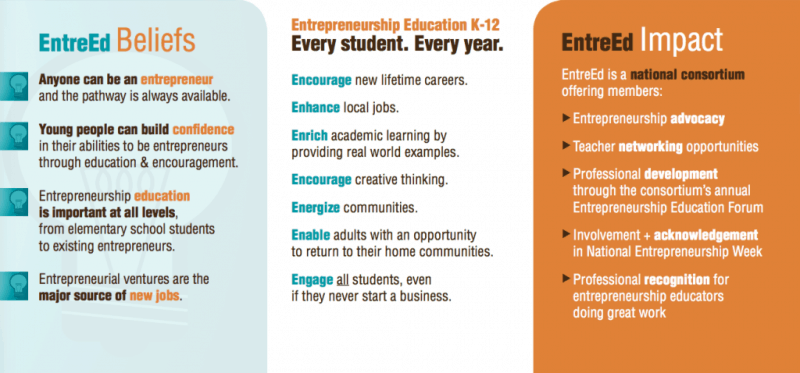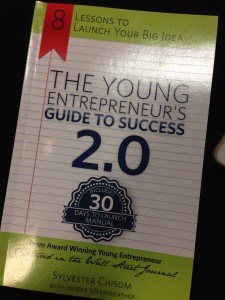Last week, I attended the EntreEd Consortium Forum in Oklahoma City with the National Consortium for Entrepreneurship Education.

EntreEd believes a lot of the same things we talk about here, starting with anyone can be an entrepreneur.
I was there because I believe small towns don’t need kids who will graduate high school or return from college, then look around for a job. We need kids who will graduate, then look for an opportunity.
I want to share the three most promising ways to teach entrepreneurship that I heard at the Forum.
1. Lemonade Day
Lemonade Day is working to address the decline in the number of startup businesses by starting kids early with entrepreneurial training. Ron Batts recently joined as President, and was the speaker I heard.
Research says that highly talented entrepreneurs perform better. To find the high school kids who will be the highly talented entrepreneurs, use an evaluation tool like Gallup’s EP10 (previously known as the Entrepreneurial Strengthsfinder.)
Just like we use youth sports to identify the highly talented athletes, let’s use youth entrepreneurship to identify the highly talented entrepreneurs.
Lemonade Day makes a point of teaching kids that when their businesses prosper, they help their communities prosper. This is extra important in small towns, where we want to be sure kids grow up to be the kind of business owners who give back.
Although the idea of lemonade stands sounds simple, the Lemonade Day organization has a lot more to recommend it. While their immediate focus is on cities of 50,000 and up, they do have a commitment to reach out to all children. Find out more about them at Lemonade Day.
2. From Idea to Real Business on $50

Sylvester Chisom’s book for students: The Young Entrepreneur’s Guide to Success
Sylvester Chisom leads a $50 Startup Program that teaches entrepreneurship by having students start real businesses. Then they sell their products directly to students and staff at a school-wide Youth Entrepreneur Day.
Starting a real business brings up crises and issues that would never come up in a business simulation or in working on an example company that isn’t real. Kids get upset when things go wrong. They care.
The kids must donate a portion to a cause, once again reinforcing the connection between business and community.
Lots of kids struggle at the idea point. Chisom starts them by looking for their passion.
- What is your tennis ball? What do you get excited about, the way a dog is excited for a tennis ball?
- What did you enjoy at age 10?
- What are your superpowers?
- What are you doing when you feel most beautiful?
- What are you willing to try now?
You can find Chisom’s curriculum and book Young Entrepreneurs Guide to Success, at Sylvester Chisom’s website.
3. ESI: Entrepreneurship Investigation
Nancy Eberle and Gregg Christensen presented Nebraska’s model for entrepreneurship education from 3rd grade through baccalaureate degree and beyond.
It started with the Community Vitality Initiative, a group of Nebraska organizations imagining a future where communities are strong, businesses thrive, and youth are engaged. They found that kids want to return to hometowns, but don’t see a place (job) for themselves. Entrepreneurial education gives them an avenue to choose where they live.
Since starting, they’ve developed programs that work in-school, after school, in summer camps, through clubs, in community-based settings or with individual learners. Out of the variety of ways they present entrepreneurship, so far the 5 day camp has been their most successful way to reach kids.
After taking ESI:
- 86% want more e training.
- 85% see themselves as entrepreneurs.
- 90% believe in planning now.
- 75% are likely to be a business owner.
- 55% know about opportunities to develop new businesses.
- 89% have found ways they can give back to their communities.
The ESI projects were all developed with rural schools and small towns in mind.
Listen to my interview with Nancy Eberle on the ESI programs.
Learn more about ESI and purchase materials at http://esi.unl.edu/
About my coverage: EntreEd provided me with a media pass to cover my registration for the Forum. I paid for all my other expenses.











Becky it was great to have you attend the 2015 FORUM for Entrepreneurship Education. You picked three good programs to highlight in this article. Each of them allow the student to experience how it feels to risk and receive the rewards of entrepreneurship. This is critical for students to gain the entrepreneurial mindset and to continue what has made the USA so wonderful. The American Dream exists because of entrepreneurship.
If you have not looked at Trep$ I hope that you will check it out. The two ladies who started this effort for middle schoolers told us they were just PTS moms. Within two years they had the PTA program of the year in New Jersey. Not their program is used in many places including dependent schools abroad. They have become true entrepreneurs as they are giving many middle school students the opportunity to experience entrepreneurship.
I could go on about many other programs throughout the nation. We just need to get every student the opportunity to gain entrepreneurship preparation every year of their educational experience. It needs to become the norm for the USA to thrive!
Thanks for sharing ideas!
Thanks, Horace. I missed hearing about Trep$, but I’m happy to have you share the details. Here is a link for those who want to check it out: http://trepsed.com/
Wow, this is awesome! Thanks for sharing! My son’s a bit too young for it right now but I’ll definitely keep it in mind for when he’s a bit older.